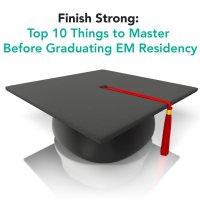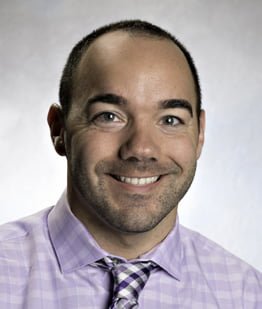 If you are a senior resident, this post is for you! Right now you’re juggling an array of responsibilities. From adjusting to your new leadership roles in the Department to applying to jobs and fellowships, it’s easy to let that pesky procedure you have always struggled with or confusing ECG finding slip by you. To help you solidify your skills this year, we have come up with a list of things to master before the end of the academic year. Take a look, and tailor this list to your background and training. Come up with a list of your own, share it with your mentors, and check off each one. Graduation will be here before you know it!
If you are a senior resident, this post is for you! Right now you’re juggling an array of responsibilities. From adjusting to your new leadership roles in the Department to applying to jobs and fellowships, it’s easy to let that pesky procedure you have always struggled with or confusing ECG finding slip by you. To help you solidify your skills this year, we have come up with a list of things to master before the end of the academic year. Take a look, and tailor this list to your background and training. Come up with a list of your own, share it with your mentors, and check off each one. Graduation will be here before you know it!
1. Become an Airway Extraordinaire
Virtually every program now gives you experience with both direct and video laryngoscopy. Not every community or academic site will have your beloved C-MAC, so make sure you are comfortable finding those vocal cords on your own. Take these final months to grab every difficult and uncomfortable airway you can, while you still have back-up at your side. Challenge yourself to get familiar with alternative forms of airway management – nasal intubations, LMA placement, and cricothyrotomies. You will stand tall at the head of the bed if you’ve always got a back-up plan up your sleeve.
2. Become the MacGyver of All Things Access
There are few clinician scenarios more stressful than a patient in desperate need of access and not a vein in sight. Push yourself to become adept with quickly placing ultrasound guided IVs, both tibial and humeral intraosseous (IO) lines, and emergent femoral and subclavian lines. Remember, if you are in the community you will likely do procedures while simultaneously running the trauma or code. Some seniors are expected in the last year of residency to “give away” your lines to more junior residents, but this isn’t always in everyone’s best interest. If there is a line you haven’t mastered, find a way to make the situation a learning opportunity for everyone involved.
3. Do Your Own Reductions
Training sites are often buoyed by a number of consulting services – including orthopedics. Community sites know this, and some may even asking you on interview days how you would perform a specific reduction. Master them early in the year – hips, shoulders, distal radius fractures. In less than a year you will be on your own and the expectation will be that you can do 99% of these reductions on your own.
4. ECG Expert = You
One of the biggest adjustments coming out of residency is that suddenly you are the one signing off on all the ECGs. The tech or computer may not catch the STEMI equivalent hiding in a stack of PVCs. Ask your attending on shift if you can simulate his or her role, looking at every ECG that comes through the department. You will learn pretty quickly which ECG patterns and arrhythmias you are comfortable with, and which ones you need to brush up on before graduation.
5. Low-Risk Chest Pain: Get Comfortable with Discharge
We all know that chest pain is one of the most common ED complaints – and in the real world, you are often sending these patients home. Where you work after residency may have a different culture around admission versus discharge than how you practiced as a resident. Develop your own evidence-based approach so that you can feel comfortable no matter where you trained or where you end up.
6. Name Your Bias
We all have them, and programs are getting better every year at introducing cognitive science education. Work through how your own individual biases may impede your taking a good history. Identify one or two type of patients or presentations that you often have a hard time with – either it zaps your energy or your early-loop closure has led to a missed diagnosis. Be intentional this year and develop a strategy for approaching these patients. A key step in becoming a master is to turn your weaknesses into strengths.
7. Pediatrics? No Problem!
Pediatric patients make up 20-30% of all ED visits across the country, and yet most residents, even at the end of training, do not feel comfortable taking care of these teeny humans! If you have elective time consider spending more time at your program’s PEM training site. Brush up on your PALS and review the “can’t miss” pediatric emergencies. You will impress your new colleagues next year when a sick child hits the door and you become the zen baby-whisperer, identifying the problem and knowing just what to do.
8. A Strategy for Dealing with Difficult Patients
Some difficult patients can monopolize your time and energy for a non-emergent condition. Others may be have altered mental status and be physically violent toward staff. We see it all in the ED, and it is our job to be the voice of reason. We take care of everyone, no matter how loud, rude, unrealistic, and yes sometimes even violent. But we are also human. These are the cases that can cumulatively lead to physician burnout. Develop a strategy for dealing with this stress in a healthy way. Maybe you have some pre-scripted phrases or statements that you use when discharging a patient with drug-seeking behaviors. Perhaps you have a personal de-brief after your shift to offload your stress in the ED, so that you do not take it home. Different strategies work for each of us, but use your last year of residency to become the calm, sage attending who knows how to navigate the parts of our job that are most stressful.
9. Be the Leader
As a resident it is easy to follow the lead of your attending, senior resident, or consultant. In practice, especially in the community, you may be the only provider at certain hours of the day. If you are heading into academia, residents will be looking to you for guidance! Make strides to think of yourself as the team leader. Start to recognize the strengths and weaknesses of your team, and how you can use the people and resources around you to make running the department look effortless to an outsider. Develop a way to speak with consultants that is both courteous and direct. Try to emulate those attendings who seem particularly skilled with navigating competing interests and handling conflict.
10. Become Comfortable with Uncertainty
Become comfortable with acknowledging what you don’t know. It will happen every shift. Possibly every hour. We can’t control what comes through the door, but we can temper down our amygdala and improve the way we respond to this uncertainty. Stay inquisitive, ask questions, and embrace the diagnostic and ethical dilemmas that are the core of what we do. Recommended reading: Dr. Justin Morgenstern of First10EM fame recently reflected on this important topic of uncertainty and lifelong learning.
There are so many more topics that could make this list! Post below some of your personal goals for senior year and keep the conversation going on Twitter with the hashtag #FinishStrongEM.
Author information
The post Finish Strong: Top 10 Things to Master Before Graduating EM Residency appeared first on ALiEM.

